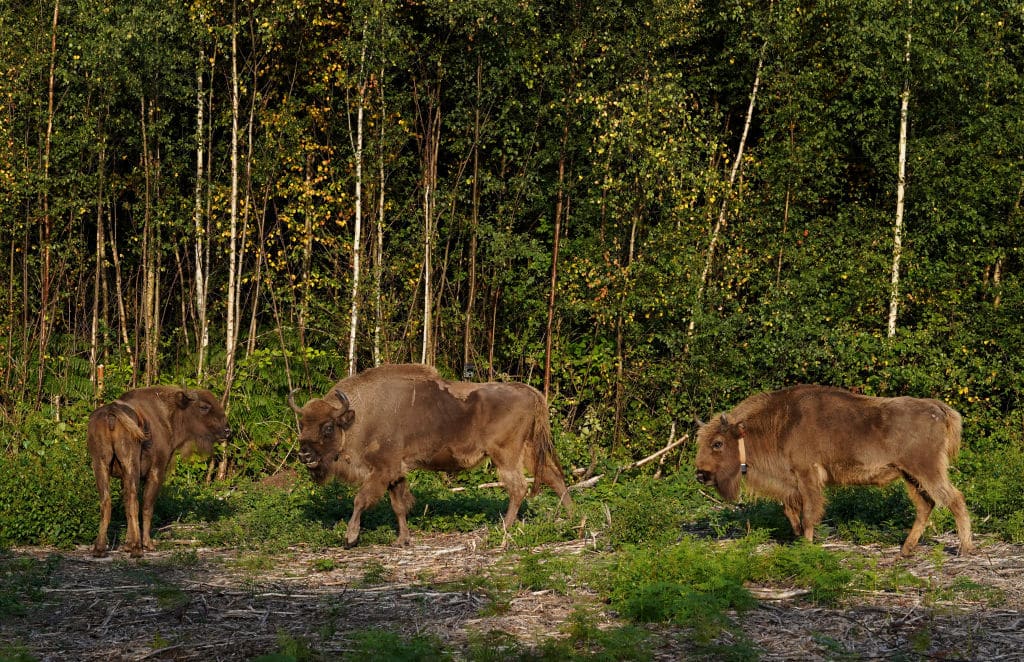Wild Bison Return to UK for First Time in Thousands of Years in Rewilding Effort

 Why you can trust us
Why you can trust us
Founded in 2005 as an Ohio-based environmental newspaper, EcoWatch is a digital platform dedicated to publishing quality, science-based content on environmental issues, causes, and solutions.
Before wild bison were reintroduced in Europe in the 1950s, the last individual died in Poland in 1919, according to Rewilding Europe. European bison are the continent’s heaviest wild land animals and can weigh over a ton. But they’re still quick, running as fast as 40 miles per hour — much faster than humans.
European bison look similar to their North American cousins, but have a lankier body, curved horns and aren’t quite so shaggy.
Currently, wild bison herds exist in some European countries, including Switzerland and Germany, with the largest population of around 1,000 living in ancient woodland on the border of Poland and Belarus.
Wild bison haven’t been seen in Britain for thousands of years, until this morning, when three of the herbivores — known as “ecosystem engineers” for their ability to naturally impact the landscape in positive ways — set hoof in the countryside near Canterbury, in Kent.
The Wilder Blean project is taking place in the West Blean and Thornden Woods, and is being led by the Wildwood Trust and Kent Wildlife Trust.
In the midst of Europe’s crippling heatwave, helping to create a more natural woodland ecosystem will help address the climate crisis by absorbing carbon dioxide from the atmosphere.
“It’s going to demonstrate the very real impact nature based solutions can have in solving the climate crisis. We’re going to prove the impact bison in the wild can have on the environment. They will create an explosion of biodiversity and build habitat resilience, locking in carbon to help reduce global temperature rise,” said Director General of Wildwood Trust Paul Whitfield, as BBC News reported.
The goal is for the wild bison to change the pine forest where they were released into a more open woodland by naturally killing trees by eating their bark and creating more open space to allow other animals and plants to flourish, reported The Guardian. The bison also disperse seeds as they move through the landscape, said Donovan Wright, one of the project’s two bison rangers.
“We want Wilder Blean to mark the beginning of a new era for conservation in the UK. We need to revolutionise the way we restore natural landscapes, relying less on human intervention and more on natural engineers like bison, boar and beaver,” said CEO at Kent Wildlife Trust Evan Bowen-Jones, as The Guardian reported.
The bison brought to Kent include one older female from Scotland’s Highland Wildlife Park and two young females from Cork, Ireland’s Fota Wildlife Park. In mid-August, a young bull will be brought from Germany to join the three females.
The bison will eventually have nearly 500 acres in which to explore, with tunnels for them to cross pedestrian trails.
“[W]e’re giving people in the UK – for the first time in over a thousand years – the chance to experience bison in the wild. It’s a really powerful, emotional, visceral experience and it’s something we’ve lost in this country,” Whitfield said, as reported by The Guardian.
Other grazing animals will join the bison, including “iron age pigs,” Longhorn cattle and Exmoor ponies. The habits of these animals go well with those of the bison, helping to facilitate their management of the natural landscape without human involvement.
The other Wilder Blean bison ranger, Tom Gibbs, told The Independent the goal of the project was “to change the mindset about what our countryside ‘should’ be like. … I really want to give people that experience of being in a wilder place and being around wild animals. I think we all need that in our lives.”
Subscribe to get exclusive updates in our daily newsletter!
By signing up, you agree to the Terms of Use and Privacy Policy & to receive electronic communications from EcoWatch Media Group, which may include marketing promotions, advertisements and sponsored content.

 233k
233k  41k
41k  Subscribe
Subscribe 




